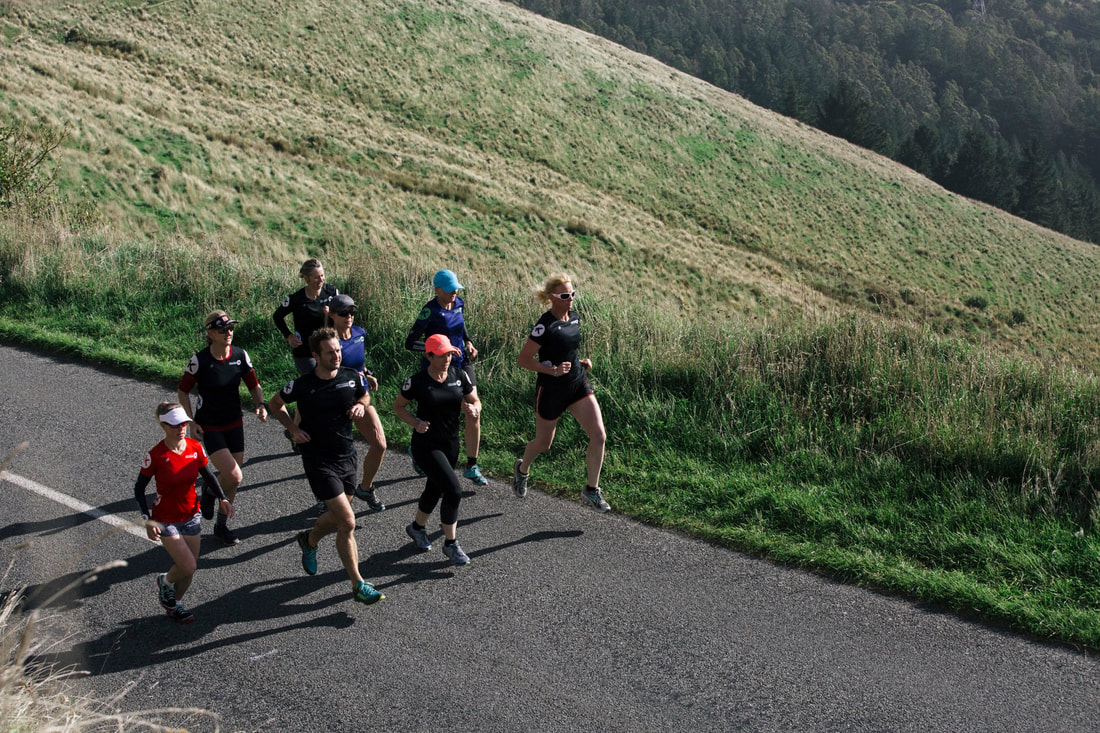| I have seven training principles which underpin how I work with athletes. Anyone who is even vaguely familiar with the manner in which I engage with people I train will know this. I think it is important however to continue to discuss these principles as I believe that applying them to a training programme will maximise the chance of an athlete meeting, or indeed exceeding, their goals. The principles are; Train short, train long, train easy, train hard, train specific, cross train, train fatigued and train the mind. |
Train Short
You could easily substitute short for the word “frequently”. The term “weekend warrior” is usually applied to the amateur athlete, however I would suggest that a weekend warrior is someone who does not train with any regularity throughout the week and does the bulk of their training, if not all of their training across two days in the weekend. There is multiple problems with this approach; if you do not do anything from Monday to Friday and then you try to jam a heavy training load into 48 hours, there is a likelihood that the body will break as the body will be overwhelmed by a huge amount of stress in one dollop. Rather than getting lots of adaptation in small doses, we expect the body to be able to adapt to a huge amount of stress in one go. When we overload the system, we get on of three responses. Either nothing happens, we get adaptation, or in the more likely scenario of the weekend warrior, the system breakdown. Several shorter runs during the week will lead to better adaptation rather than nothing in the week and a huge weekend load.
Train Long
I define long as up to two and and a half hours, maybe stretching to three hours. We need to train long mainly to build capacity. One of the things that I see with many runners is a lack of capacity. The capacity that I am referring to is their inability to maintain an intensity, be that high or low, for an extended period of time. Tied very closely to the inability to maintain intensity is the inability to maintain form and technique. I would suggest very strongly that in order to say, run a marathon, an athlete should be able to run for at least 120 minutes in training with good form and technique. A long run once or twice a week is going to further aid in our adaptation and preparation for an event.
A long run of up to two and a half hours, far from being arbitrary, is the point up to which we achieve great physiological benefit, it is achievable and something that you are able to recover from relatively easily. Beyond that there is a suggested law of diminishing returns. Our fatigue becomes exponentially greater, the stress on our bodies is exponentially greater and therefore our recovery time is exponentially longer. With our bodies being in a state of recovery and repair, our ability to train with increased frequency and intensity (as mentioned in my first point) is compromised. One of the other benefits of training long is preparing ourselves psychologically to handle time on our feet, however we need to be cognisant of balance between what is psychologically beneficial and what is physiologically beneficial.
Train Easy
The vast majority of one’s training should be at a relatively easy intensity. Running at higher intensity puts higher stress on the body and there is greater recovery time. This delays our adaptation. In some cases, training at too higher an intensity can lead to maladaptation, we may indeed get slower in our desire to become faster. We need to balance this out with a lot of easy running. Easy running develops our aerobic system, which underpins our anaerobic system. Easy should not be misconstrued as slow, it is still up to about 80% of your threshold pace. This is a pace that is sustainable, and that you could maintain for up to the duration of your long run.
Train Hard
We need to devote a period of our time running to training hard, but how much? We want to do as little hard training as we can, such that we will get positive adaptation. This obviously means different amounts of hard training for different athletes, however in this case, more is not necessarily better. The harder you push, the more likely you are to overload your system. Hard training is absolutely useful, however it must be applied judiciously and consistently. The amount of hard training we undertake will also depend on what phase we are at in our training programme; if we are in an aerobic phase we might expect to do 80% easy 20% hard. A strength phase would be perhaps 70% easy, 30% hard, with a speed phase having a breakdown of perhaps 60% easy, 40% hard. The longer the event we are training for, especially if it is anything over a marathon distance, then the amount of hard training we will do will drop even further, to perhaps 90% easy, 10% hard. The rationale for this is that the amount of preparation for a long event will put the body under greater stress and harder efforts can overload someone even more easily in this case. When it comes to hills and off road running, we are going to need to monitor our exertion through different means than just pace i.e. heart rate, perceived exertion, respiratory rate etc. One point I would raise is if one were to be training for an event like Coast to Coast or Ironman, with multiple disciplines, then it would be worth considering raising the amount of high intensity work in each discipline, as the differing stimulus will enable the muscles used to recover quicker than if you were doing one thing repetitively.
Train Specific
Or if not specific, train creative. As much of our training as possible should be specific to what we will be running on during our event. For instance, if you are going to run the Abel Tasman Coastal Classic, then you should probably run somewhere coastal to prepare. Many of us live in suburbia, and so we may need to get creative with this. Most towns have Botanic Gardens, and these are often a good place to start. This can be applied in the short term, as above, or longer term, in terms of planning for future events. If your main event, which is twelve months away, is a road marathon, but you have some trail stuff before this, then sure, put some short term efforts into training off road, but the majority of your preparation for your road event should be done on the road. And vice versa.
Cross Training
Cross training is beneficial because it helps us to be a better animal. Cross training uses different muscle groups, it is psychologically refreshing, and can aid in limiting stress on the muscles that we are using regularly in our consistent training. Cross training can be done within running, rather than say doing plyometric exercises or swimming, experiment with different shoes, terrain, carry a backpack sometimes if you don’t normally. This will change up the load on your body and be beneficial. I have an evolving thought about coming up with a list of different forms of cross training, and undertaking these for 6-8 (maybe more) weeks and seeing what benefit this gives me both psychologically and physiologically, before moving on to another form of training.
Train The Mind
There are multiple ways of training the mind, from visualisation, to mental strategies to ease distress, or meditation. For me, training the mind is about creating a new normal. For instance, running for 90 minutes in the morning and a further half an hour in the evening is a challenging thing for many, however in doing so, we are creating a new normal for ourselves. When we are under times of physiological and psychological stress during an event, we are greater able to sit with it and still function better than someone who has not prepared themselves comprehensively.
Train Fatigued
We need to access similar levels of fatigue that you will experience in an event to create a new normal. Becoming familiar with pushing the body to accept greater intensity (both physiologically and psychologically) is easier when you have experienced it in training.
You could easily substitute short for the word “frequently”. The term “weekend warrior” is usually applied to the amateur athlete, however I would suggest that a weekend warrior is someone who does not train with any regularity throughout the week and does the bulk of their training, if not all of their training across two days in the weekend. There is multiple problems with this approach; if you do not do anything from Monday to Friday and then you try to jam a heavy training load into 48 hours, there is a likelihood that the body will break as the body will be overwhelmed by a huge amount of stress in one dollop. Rather than getting lots of adaptation in small doses, we expect the body to be able to adapt to a huge amount of stress in one go. When we overload the system, we get on of three responses. Either nothing happens, we get adaptation, or in the more likely scenario of the weekend warrior, the system breakdown. Several shorter runs during the week will lead to better adaptation rather than nothing in the week and a huge weekend load.
Train Long
I define long as up to two and and a half hours, maybe stretching to three hours. We need to train long mainly to build capacity. One of the things that I see with many runners is a lack of capacity. The capacity that I am referring to is their inability to maintain an intensity, be that high or low, for an extended period of time. Tied very closely to the inability to maintain intensity is the inability to maintain form and technique. I would suggest very strongly that in order to say, run a marathon, an athlete should be able to run for at least 120 minutes in training with good form and technique. A long run once or twice a week is going to further aid in our adaptation and preparation for an event.
A long run of up to two and a half hours, far from being arbitrary, is the point up to which we achieve great physiological benefit, it is achievable and something that you are able to recover from relatively easily. Beyond that there is a suggested law of diminishing returns. Our fatigue becomes exponentially greater, the stress on our bodies is exponentially greater and therefore our recovery time is exponentially longer. With our bodies being in a state of recovery and repair, our ability to train with increased frequency and intensity (as mentioned in my first point) is compromised. One of the other benefits of training long is preparing ourselves psychologically to handle time on our feet, however we need to be cognisant of balance between what is psychologically beneficial and what is physiologically beneficial.
Train Easy
The vast majority of one’s training should be at a relatively easy intensity. Running at higher intensity puts higher stress on the body and there is greater recovery time. This delays our adaptation. In some cases, training at too higher an intensity can lead to maladaptation, we may indeed get slower in our desire to become faster. We need to balance this out with a lot of easy running. Easy running develops our aerobic system, which underpins our anaerobic system. Easy should not be misconstrued as slow, it is still up to about 80% of your threshold pace. This is a pace that is sustainable, and that you could maintain for up to the duration of your long run.
Train Hard
We need to devote a period of our time running to training hard, but how much? We want to do as little hard training as we can, such that we will get positive adaptation. This obviously means different amounts of hard training for different athletes, however in this case, more is not necessarily better. The harder you push, the more likely you are to overload your system. Hard training is absolutely useful, however it must be applied judiciously and consistently. The amount of hard training we undertake will also depend on what phase we are at in our training programme; if we are in an aerobic phase we might expect to do 80% easy 20% hard. A strength phase would be perhaps 70% easy, 30% hard, with a speed phase having a breakdown of perhaps 60% easy, 40% hard. The longer the event we are training for, especially if it is anything over a marathon distance, then the amount of hard training we will do will drop even further, to perhaps 90% easy, 10% hard. The rationale for this is that the amount of preparation for a long event will put the body under greater stress and harder efforts can overload someone even more easily in this case. When it comes to hills and off road running, we are going to need to monitor our exertion through different means than just pace i.e. heart rate, perceived exertion, respiratory rate etc. One point I would raise is if one were to be training for an event like Coast to Coast or Ironman, with multiple disciplines, then it would be worth considering raising the amount of high intensity work in each discipline, as the differing stimulus will enable the muscles used to recover quicker than if you were doing one thing repetitively.
Train Specific
Or if not specific, train creative. As much of our training as possible should be specific to what we will be running on during our event. For instance, if you are going to run the Abel Tasman Coastal Classic, then you should probably run somewhere coastal to prepare. Many of us live in suburbia, and so we may need to get creative with this. Most towns have Botanic Gardens, and these are often a good place to start. This can be applied in the short term, as above, or longer term, in terms of planning for future events. If your main event, which is twelve months away, is a road marathon, but you have some trail stuff before this, then sure, put some short term efforts into training off road, but the majority of your preparation for your road event should be done on the road. And vice versa.
Cross Training
Cross training is beneficial because it helps us to be a better animal. Cross training uses different muscle groups, it is psychologically refreshing, and can aid in limiting stress on the muscles that we are using regularly in our consistent training. Cross training can be done within running, rather than say doing plyometric exercises or swimming, experiment with different shoes, terrain, carry a backpack sometimes if you don’t normally. This will change up the load on your body and be beneficial. I have an evolving thought about coming up with a list of different forms of cross training, and undertaking these for 6-8 (maybe more) weeks and seeing what benefit this gives me both psychologically and physiologically, before moving on to another form of training.
Train The Mind
There are multiple ways of training the mind, from visualisation, to mental strategies to ease distress, or meditation. For me, training the mind is about creating a new normal. For instance, running for 90 minutes in the morning and a further half an hour in the evening is a challenging thing for many, however in doing so, we are creating a new normal for ourselves. When we are under times of physiological and psychological stress during an event, we are greater able to sit with it and still function better than someone who has not prepared themselves comprehensively.
Train Fatigued
We need to access similar levels of fatigue that you will experience in an event to create a new normal. Becoming familiar with pushing the body to accept greater intensity (both physiologically and psychologically) is easier when you have experienced it in training.





